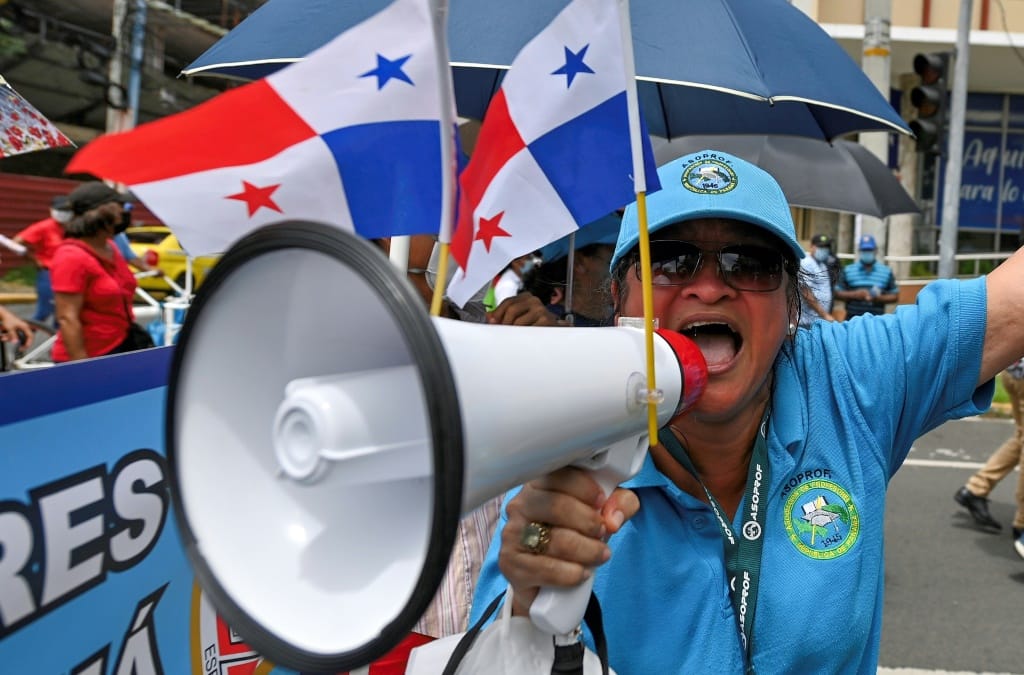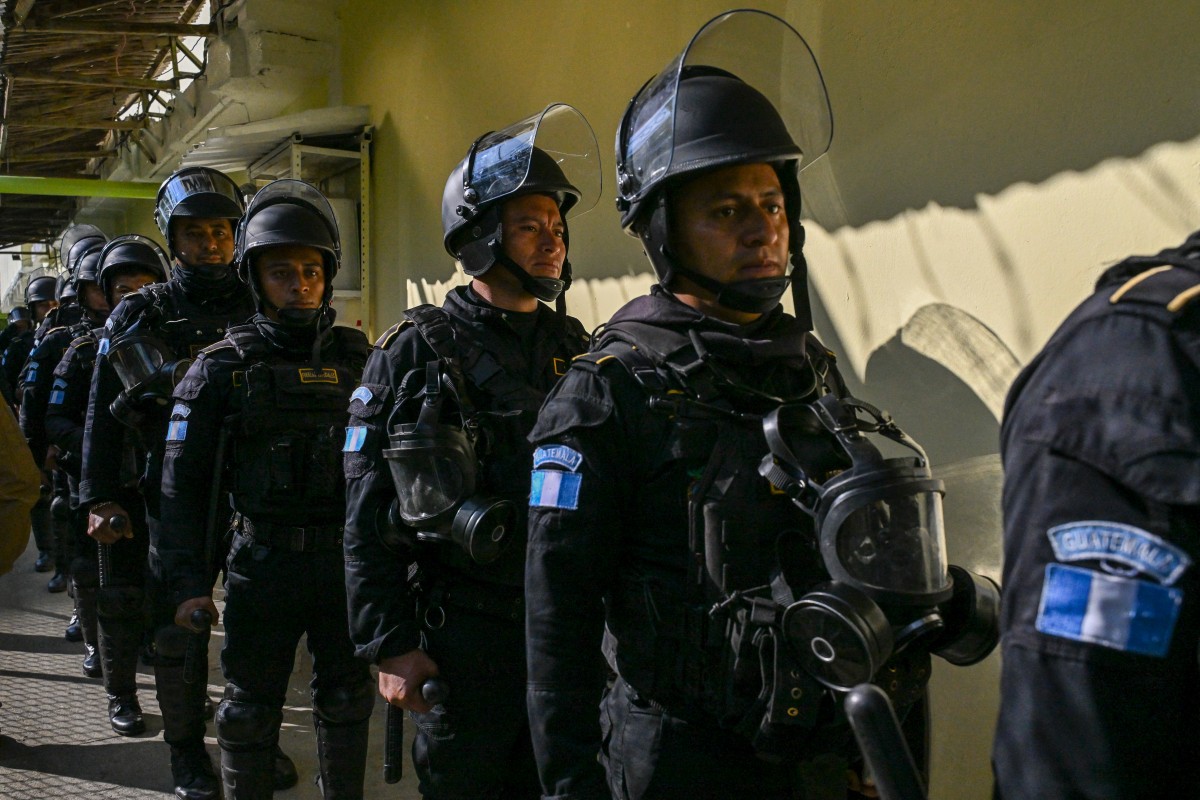Central America
Panama govt, protesters edge closer in talks to end road closures

AFP
The Panamanian government and protesters edged closer Monday to an agreement to end a weeks-long living cost revolt that has blocked roads, interrupted food supplies and damaged the economy.
Authorities agreed in the early morning hours to reduce the price of 72 basic consumer items by some 30 percent on average.
“The national government has every intention of continuing dialogue and today has shown it also has the will to reach agreements,” Labor Minister Doris Zapata said on the fifth day of marathon talks in Penonome, 150 kilometers (93 miles) southwest of the capital Panama City.
“There is already the first step on the road to solving the problems of the social crisis that this country is experiencing,” said Fernando Abrego, a spokesman for one of the demonstrators.
For three weeks, amid worsening economic woes for Panama, protesters demanding lower fuel, food and medicine prices have blockaded the crucial Pan-American Highway and other major roads with stalled trucks and burning tires. Some have clashed with police.
Despite its dollarized economy and impressive growth figures, the country of 4.4 million people has one of the world’s highest rates of social inequality, with poor access to health services, education and clean drinking water in some areas.
The demonstrations have triggered food and fuel shortages in some parts of the country, and the business sector says some $500 million has been lost.
Even before the talks started, the government had lowered the price of 18 basic products and that of fuel from $5.20 per gallon to $3.25 in an unsuccessful bid to end the standoff.
Protesters had demanded a lowering of the price of 82 products and want a limit to be imposed on company profits, a measure the government has rejected.
Other demands include reducing the price of medicines and electricity, increasing investment in education and the public health system, and measures against government corruption.
Luis Sanchez, another spokesman for the protesters, said some roads have been opened in a gesture of good faith.
But the government asked for all blockades to be ended.
“There is a population distressed by the closures,” said Zapata.
Central America
Guatemala isolates Barrio 18 leader after attacks that killed 11 police

Guatemalan authorities have placed a leader of the Barrio 18 gang in an isolated cell without الكهرباء or “privileges” after he was accused of triggering a recent wave of violence that left 11 police officers dead, the government said on Sunday.
Members of Barrio 18, which is designated as a “terrorist” organization by both the United States and Guatemala, carried out the killings on January 18 in retaliation for the government’s takeover of three prisons that had been under the control of inmates linked to the group.
In response to the attacks, President Bernardo Arévalo declared a month-long state of siege, arguing that gang members were seeking better conditions in prison or transfers to lower-security facilities.
In a message posted on X alongside photographs, Arévalo announced the isolation of Aldo Dupie, also known as “El Lobo,” one of the gang leaders who allegedly directed the uprisings.
Images released by the government show Dupie inside a small cell with narrow windows, built from metal containers, in a secured area of the Renovación I prison in southern Guatemala — the same facility where the hostage-taking riot took place.
With a shaved head and a stern expression, the gang leader appears alone and in handcuffs, according to the photographs.
Guatemala’s prison system said the “new area,” protected by metal fencing and barbed wire, will house high-risk inmates who will remain without privileges or electricity.
Sports
Shakira ignites El Salvador with near sold-out residency at Mágico González Stadium

The recently renovated Jorge “Mágico” González Stadium is rolling out the red carpet for Colombian superstar Shakira, whose string of concerts has sold out almost entirely, confirming the powerful bond between the artist and Salvadoran fans.
The scale of the experience begins as soon as attendees arrive at the venue. Outside the stadium, organizers have installed several photo spots so concertgoers can capture a souvenir from the major event.
Fans attending the Las Mujeres Ya No Lloran World Tour will witness a top-tier visual production, where technology and robotic lighting effects will shape an atmosphere that shifts dramatically from one segment of the show to another — moving from the intensity of ’90s rock to the festive explosion of urban pop.
Security and crowd management have been top priorities, with a coordinated operation aimed at ensuring smooth entry and exit, allowing spectators to focus solely on enjoying hits that have defined generations.
Beyond the music, the event marks a milestone for the country’s live-entertainment industry, positioning El Salvador as a destination capable of hosting artist residencies once reserved for cities such as Las Vegas or London.
The excitement is already visible across the capital: hotels are at full capacity and local businesses are riding the wave of enthusiasm sparked by the latest songs from the Colombian star.
Central America
Salvadoran fans plan birthday surprise for Shakira at historic show

The president of Shakira’s Fan Club in El Salvador was interviewed by Diario El Salvador on Saturday as she made her way to her entrance gate at Jorge “Mágico” González Stadium, ahead of the historic concert the Colombian superstar is set to perform in the country.
Before the first of the five shows that make up Shakira’s Salvadoran residency, the fan leader revealed that supporters had prepared a special surprise for the singer, who turned 49 on February 2.
“Today I’m here around the stadium with the props we made for her celebration, with postcards and her songs. We also have kits ready to sing ‘happy birthday’ to our She Wolf,” she said.
She explained that the group used social media to ask fans seated in the Ultra Platinum and Platinum sections to find them and pick up birthday pennants, party headbands, balloons and whistles. The idea is to sing “happy birthday” while Shakira introduces her band, offering what they describe as a special Central American welcome.
“For me, she has been a megastar since the first time I saw her in 1996. I saw her again in 2006, here at the stadium. Last year we traveled to Colombia three times to see her, and today I’m beyond excited that she chose El Salvador,” the fan said.
She added that visitors from across Central America and other countries have traveled for the concerts and will also have the opportunity to discover the country. “I’m very excited about everything she makes us feel,” she said.
-

 Central America5 days ago
Central America5 days agoPanama Will Not Be Threatened, President Says Amid Rising Tensions With China
-

 International5 days ago
International5 days agoDíaz-Canel Calls for Talks With Washington Without Pressure as U.S. Tightens Oil Sanctions
-

 International4 days ago
International4 days agoColombia to Send High-Level Delegation to Ecuador to Ease Trade Tensions
-

 International5 days ago
International5 days agoVenezuela Debates Broad Amnesty Law Covering 27 Years of Chavismo
-

 Central America3 days ago
Central America3 days agoSalvadoran fans plan birthday surprise for Shakira at historic show
-

 Central America2 days ago
Central America2 days agoGuatemala isolates Barrio 18 leader after attacks that killed 11 police
-

 Central America5 days ago
Central America5 days agoBukele’s Approval Rating Climbs to 91.9% in El Salvador, Survey Shows
-

 Sports2 days ago
Sports2 days agoShakira ignites El Salvador with near sold-out residency at Mágico González Stadium
-

 International4 days ago
International4 days agoSuper Bowl Halftime Show Puts Bad Bunny—and Immigration Politics—Back in the Spotlight


























